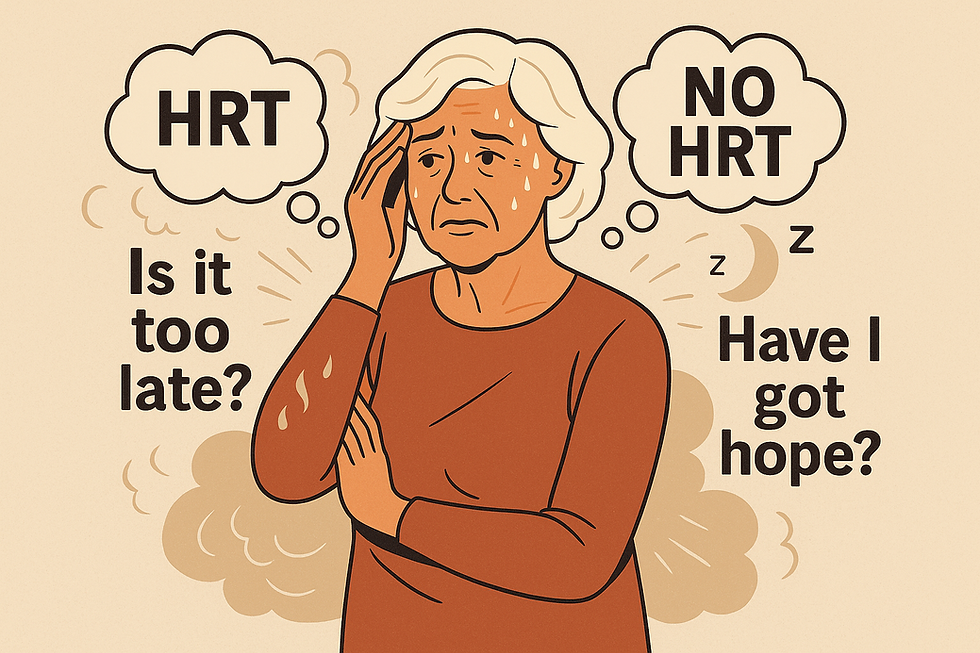HRT Can Be Used at Any Time: Provided the Clinician Is Experienced
- purity carr
- Sep 22, 2025
- 4 min read

Hormone Replacement Therapy (HRT) is often described as something that must be started within ten years of menopause or before the age of sixty. This timing is important because studies show that starting HRT earlier tends to give the best balance of benefits and safety. But what if you are more than ten years past your last period? Does that mean HRT is no longer an option? The answer is no. HRT can be used at any time, provided the clinician prescribing it is experienced and follows a careful, individualized approach.
Starting Later: The Low Dose Build Up Approach
For women who are more than ten years postmenopausal, the approach is different from those in their fifties.• Start with a very low dose of estrogen, usually transdermal (through the skin), to minimize risks and allow the body to adapt.• Gradually build up the dose only as needed to relieve symptoms or protect bone and brain health.• Cholesterol and cardiovascular health must be checked and managed. If cholesterol is not controlled, it is important to treat it at the same time as starting HRT. This is because stable cholesterol levels help keep plaques in the arteries from rupturing.
The Dementia Question: What Does the Evidence Say
There has been controversy about whether HRT increases dementia risk if it is started late.• The Women’s Health Initiative Memory Study (WHIMS) suggested an increased risk of dementia when oral combined HRT was started in women aged 65 and above. However, this study used synthetic hormones at higher doses, and participants had already been many years postmenopausal.• More recent data show a different picture. Observational studies suggest that starting HRT closer to menopause may protect against dementia, while starting later may not carry the same protective effect. Importantly, there is no strong evidence that transdermal, body identical HRT given at low doses increases dementia risk when used carefully.The key point is that the risk seems to be related to age at initiation, type of hormones, and route of administration. An experienced clinician will take all these factors into account.
Does Transdermal Estrogen Destabilize Plaques
A common concern is whether estrogen, particularly when started late, could destabilize existing arterial plaques and trigger events like heart attack or stroke.• Oral estrogen has more impact on the liver, clotting factors, and triglycerides, and is less safe in older women.• Transdermal estrogen (patches, gels, sprays) bypasses the liver, has minimal effect on clotting factors, and is considered much safer.Current evidence suggests that transdermal estrogen does not destabilize plaques. In fact, by improving vascular function and reducing inflammation, it may contribute to plaque stability, especially when cholesterol is managed alongside.
The Take Home Message
HRT can be considered at any time after menopause if the clinician is skilled and experienced.In women more than ten years postmenopause, a low dose, gradual approach is essential.Cardiovascular health, especially cholesterol levels, must be optimized at the same time.Evidence around dementia is complex, but body identical, transdermal HRT at low doses does not appear to increase risk when used wisely.Transdermal estrogen is the preferred route in older women, and current evidence suggests it supports rather than destabilizes vascular health.The most important factor is individualized care. Every woman’s health history, risk factors, and goals must be considered. With the right approach, HRT can be used safely and effectively even years after menopause.
EVIDENCE BASIS:
Starting HRT Later and Cardiovascular Risk
The 2017 NAMS Position Statement on Hormone Therapy, North American Menopause Society
“For women who initiate hormone therapy more than 10 years from menopause onset or who are aged 60 years or older, the benefit-risk ratio appears less favorable because of the greater absolute risks of coronary heart disease, stroke, venous thromboembolism, and dementia. However, longer durations of therapy may be appropriate for documented indications such as persistent vasomotor symptoms, with shared decision-making and periodic reevaluation.”(The North American Menopause Society. Menopause. 2017;24(7):728–753.)
European Menopause and Andropause Society (EMAS) Position Statement 2020
“In women starting HT more than 10 years after menopause or aged over 60, treatment should be initiated with the lowest effective dose, preferably transdermal estradiol, and cardiovascular risk factors should be addressed.”(Stute P, et al. Maturitas. 2020;139:1–15.)
Dementia and Timing of HRT
WHIMS (Women’s Health Initiative Memory Study, 2003)
Found increased risk of dementia when oral conjugated equine estrogens plus medroxyprogesterone acetate were started in women aged 65–79.(Shumaker SA, et al. JAMA. 2003;289(20):2651–2662.)
Observational and registry studies (2020 review)
Suggest that starting HRT close to menopause may reduce dementia risk, while starting late shows no benefit or possible harm with oral formulations.(Maki PM, et al. Endocr Rev. 2020;41(2):273–319.)
Plaque Stability and Transdermal Estrogen
Koh KK, et al. Circulation. 2001;104(13):1519–1524.
Demonstrated that estrogen therapy improves vascular reactivity and reduces inflammatory markers, suggesting improved plaque stability.
Canonico M, et al. BMJ. 2008;336:1227–1231.
Found that oral estrogen increases risk of venous thromboembolism, while transdermal estrogen does not significantly increase risk.
2020 ESHRE/EMAS joint statement
Recommends transdermal estradiol as the safest route in older postmenopausal women because of minimal impact on clotting and metabolic risk factors.(Stute P, et al. Maturitas. 2020;139:1–15.)
Summary Evidence
Early start (<10 years from menopause): best benefit-risk profile.
Late start (>10 years): possible but requires low-dose, transdermal route, cardiovascular risk management, and experienced clinical supervision.
Dementia risk: mainly seen with oral synthetic regimens in women >65; not confirmed with transdermal body-identical estradiol at low doses.
Plaque stability: no evidence that transdermal estradiol destabilizes plaques; in fact, data suggest it improves vascular health.
Dr Purity Carr






Comments